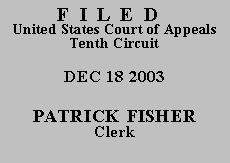

| UNITED STATES OF AMERICA,
v.
FRANK ALVAREZ |
|
Before SEYMOUR, MURPHY, and O'BRIEN, Circuit Judges.
After examining the briefs and appellate record, this panel has determined
unanimously that oral argument would not materially assist the determination of
this appeal. See Fed. R. App. P. 34(a)(2); 10th Cir. R. 34.1(G). The case is
therefore ordered submitted without oral argument.
Frank Alvarez appeals the non-custodial portions of a sentence imposed for attempted distribution of cocaine, claiming the Government failed to fulfill its obligations in his plea agreement. Originally, the Government contended we lacked jurisdiction to hear this appeal. In later briefing, it admitted the appeal was properly taken and confessed error. The Government admits it failed in its promise to Alvarez and joins him in his request for remand. Accepting that the Government erred as it confesses, we vacate the non-custodial portion of Alvarez's sentence and remand for resentencing.
Indicted on five counts of drug-related charges, Alvarez pled guilty to one count of attempting to distribute approximately five kilograms of cocaine, in violation of 21 U.S.C. §§ 841(a)(1), (b)(1)(B), and 846, and waived his right to appeal from the sentence imposed. In exchange for his plea of guilty, the Government agreed it would dismiss the remaining charges, recommend sentencing at the low end of the Guidelines, and inform the court of the nature and extent of Alvarez's cooperation prior to sentencing.
Although the Government indicated at the plea hearing that Alvarez was in the process of cooperating, it failed to further inform the district court of his cooperation either in the presentence report or argument to the judge at sentencing. Lacking this information, the district court imposed, inter alia, a sentence at the low end of the Guideline range: ninety-seven months imprisonment followed by four years supervised release. It also denied Alvarez federal benefits for a period of five years. 21 U.S.C. § 862(a).
We have jurisdiction to review our jurisdiction. United States v. Rubio, 231 F.3d 709, 711 (10th Cir. 2000). In this case, jurisdiction exists under 28 U.S.C. § 1291, despite Alvarez's waiver of appeal, because the Government admits it violated the plea agreement. United States v. Guzman, 318 F.3d 1191, 1195 (10th Cir. 2003).
The parties agree the Government was obliged to inform the court not only of the fact of Alvarez's cooperation, but its essential character and scope as well. They also agree that, while an inadvertent mistake, the Government's omission prejudiced Alvarez, at least to the degree that the evidence may have prevented the restriction of federal benefits. 21 U.S.C. § 862(e) (penalties shall not apply to any individual who cooperates or testifies with the Government in the prosecution of a state or federal offense).
Generally, the Government's breach of a plea agreement results in remand to the district court for its determination as to whether the defendant should be resentenced by a different judge or should be allowed to withdraw his guilty plea. United States v. Brye, 146 F.3d 1207, 1213 (10th Cir. 1998). Because Alvarez does not allege the Government intentionally breached the agreement and he appeals only the non-custodial portions of his sentence, setting aside the plea agreement is not necessary. Id. Both parties waive transfer of this case to a different judge.(1) Accordingly, the non-custodial portions of the sentence imposed by the district court are VACATED and the case is REMANDED for resentencing under the terms of the plea agreement.
Entered by the Court:
TERRENCE L. O'BRIEN
United States Circuit Judge
*. This order and judgment is not binding precedent except under the doctrines of law of the case, res judicata and collateral estoppel. The court generally disfavors the citation of orders and judgments; nevertheless, an order and judgment may be cited under the terms and conditions of 10th Cir. R. 36.3.
1.We need not decide whether the Supreme Court's language in Santobello v. New York, 404 U.S. 257, 263 (1971), is properly viewed as stating an automatic rule that our remand for resentencing requires a transfer to a different judge, although we recognize this issue is decided differently among the circuits. See, e.g., United States v. Hayes, 946 F.2d 230, 236 (3rd Cir. 1991) (if specific performance is elected, [defendant] must be resentenced by a different judge as dictated in Santobello). But see United States v. Bowler, 585 F.2d 851, 856 (7th Cir. 1978) (resentencing before a different judge is not necessary); United States v. Arnett, 628 F.2d 1162, 1166 (9th Cir. 1979) (remand need not be to a different judge).